Can You Talk While Skydiving?
Skydiving
Posted by: Skydive Palm Beach
3 weeks ago
You’ve got your jump booked, your nerves (mostly) in check, and you’re ready for the experience of a lifetime. You can breathe when skydiving, of course, but here’s something you might not know for sure: Can you talk when skydiving? It’s a fair question. After all, you see it in the movies all the time, skydivers having full-blown conversations mid-air like they’re in a coffee shop. But what’s the reality?
Can You Talk in Freefall?
Technically speaking, yes. You can open your mouth when skydiving, form words, and make noise in freefall. Your body isn’t restricted from talking just because you’re falling at 120 mph. You’re not gasping for air or in any danger of your lungs “freezing up,” like some myths suggest.
But here’s the catch: no one’s going to hear you! Even yelling doesn’t really carry. If you’re jumping tandem, your instructor might hear a faint “WOOHOO!” but that’s usually about it.
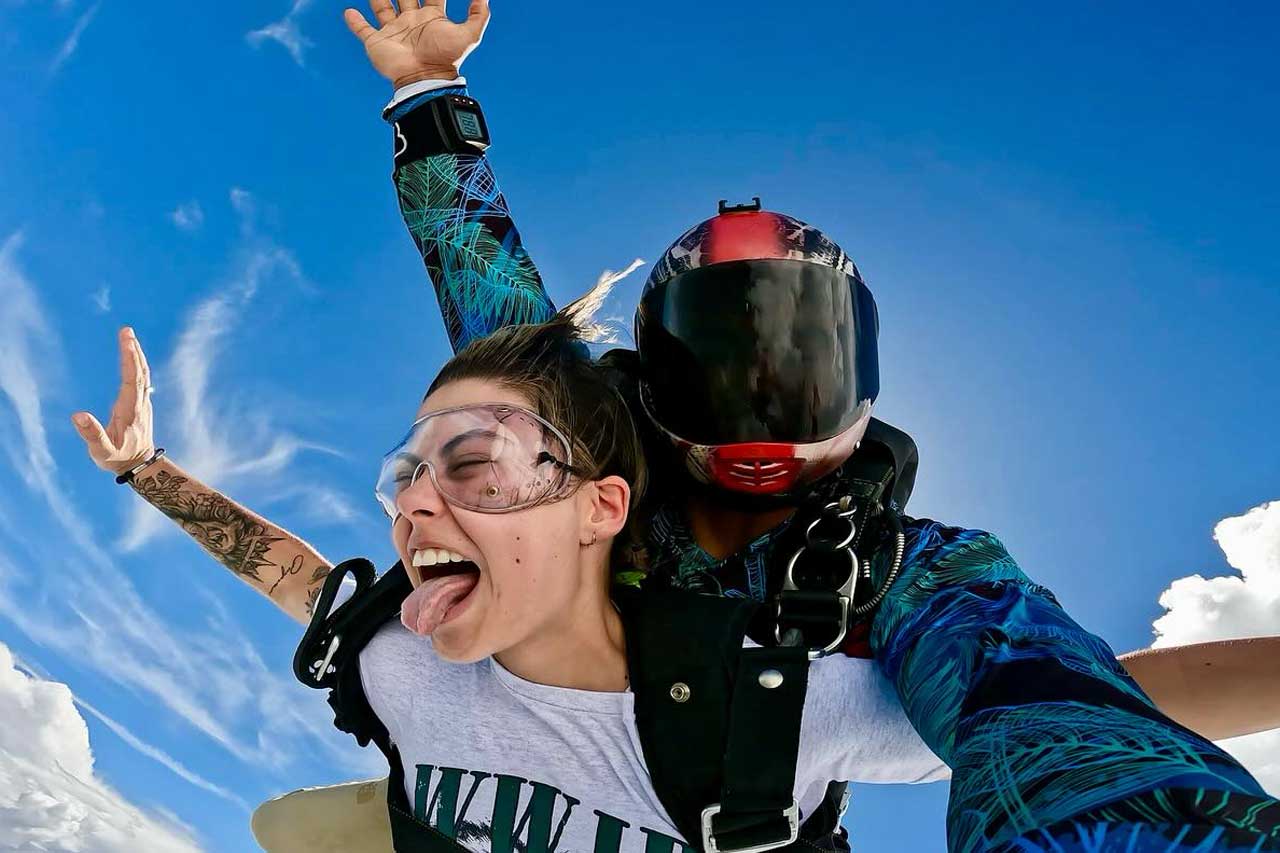
However, there is one good reason to scream in freefall even if no one can hear you! Many first-time skydivers forget to breathe. It’s a natural response to shock and excitement. People sometimes hold their breath or only take shallow inhales. Screaming forces an exhale, which helps reset your breathing rhythm and reduces tension. If you’re feeling light-headed or overwhelmed, yelling can actually help you feel more grounded.
So yes, you can talk when skydiving … but it’s not practical, and it’s not an effective method of communication in freefall. Luckily, skydivers have other ways to stay connected mid-jump.
How Do Skydivers Communicate?
Just because we can’t talk in freefall doesn’t mean we can’t communicate. Skydiving has its own set of non-verbal cues and systems that work reliably, even at terminal velocity.
Here’s what we use:
- Skydiving Hand Signals: These are the primary method of communication between instructors and students learning to skydive solo. They allow instructors to correct body position, indicate turns or tracking directions, and more. Students are taught these signals ahead of time so they can respond quickly and accurately during a jump.
- Eye Contact: Subtle but powerful. Eye contact helps instructors and skydiving students maintain awareness and reassurance. It’s a quick way to check in mid-air and feel grounded, even in freefall.
- Body Language: Tension, head position, and arm placement all say a lot about how someone is doing. In formation skydiving, especially, reading body language becomes second nature.
- Helmet Comms: Some licensed skydivers, particularly in wingsuit flying, canopy formation, or team jumps, use radio systems or in-helmet communications. These are helpful tools, but not commonly used in recreational jumping or tandem skydives.
Can You Hear Anything While Skydiving?
Well, yes, you can hear the rush of the air. When you’re in freefall, the wind noise is incredibly loud, roughly 115 decibels. This constant roar makes it nearly impossible to hold a conversation.
To put it in perspective:
- Freefall noise: ~115 dB
- Jackhammer: ~100 dB
- Motorcycle engine (close range): ~95 dB
“Can I listen to music while skydiving?” Yeah, no. Listening to music won’t dampen the freefall noise. Plus, it’s discouraged for experienced skydivers and not allowed for students. The wind would totally drown out the sound, and wearing earbuds could be a distraction (especially when they’d fly out of your ears during freefall). Staying fully alert and focused is critical at every stage of the jump.
When Can You Actually Talk?
Once the parachute is deployed, everything changes. Your descent slows dramatically, usually to around 15-20 mph, and the roar of the wind fades away. It becomes quiet. Peaceful. That’s when real conversation becomes possible.
This is when most people start talking: about how incredible it was, how nervous they were, or the beautiful view. The contrast between the rush of freefall and the calm of the canopy ride is so dramatic, it can be emotional, even overwhelming in the best way.
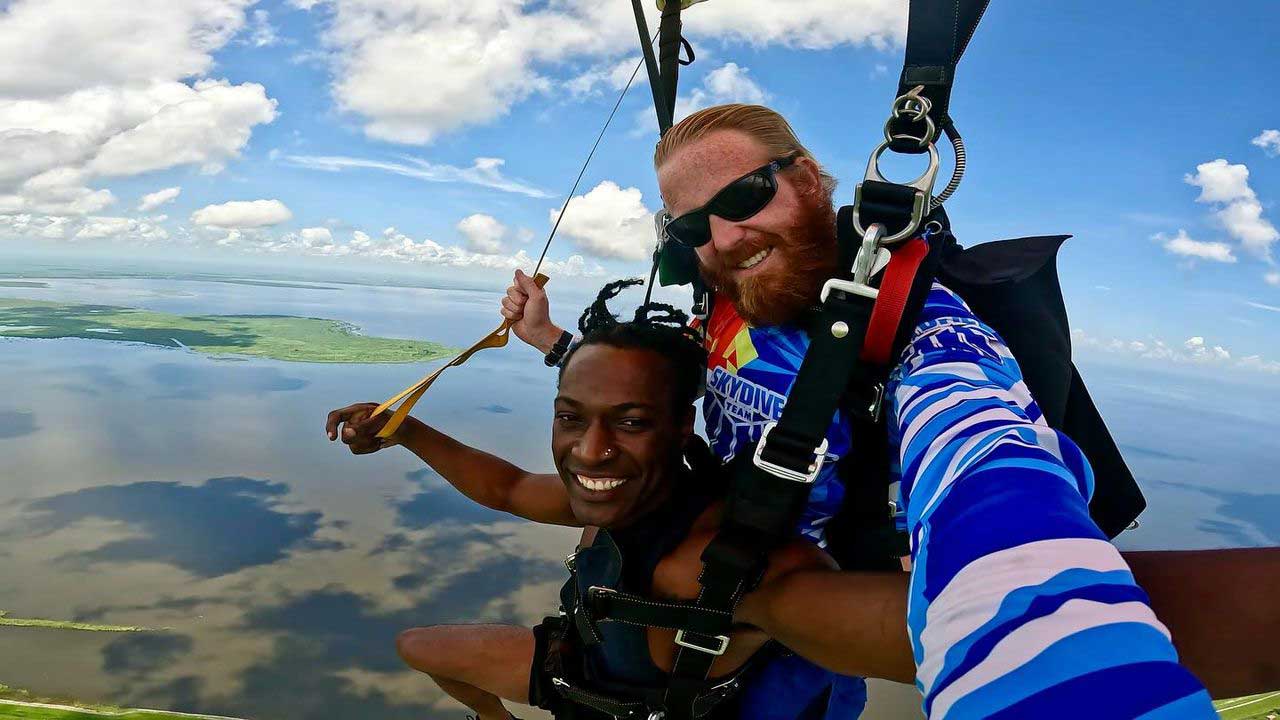
Skydiving In Movies: How They Get It So Wrong
Skydiving scenes in movies are made for storytelling. Characters yell across the sky with perfect clarity, trade jokes, or carry out elaborate plans mid-air. It’s fun to watch, but it’s not remotely realistic.
In real life, any “conversation” in freefall would be:
- Unintelligible
- Drowned out by the wind
- Logistically impossible without advanced mic systems (and even those are limited)
So, the next time you see action stars chatting mid-jump, just remember it’s pure Hollywood fiction.
Final Takeaway: Talking Is Overrated Anyway
Can you talk while skydiving? Technically, yes. But no one will hear you, and honestly, it doesn’t matter. Freefall isn’t about words. It’s about sensation, emotion, and pure experience. And when the parachute opens, that’s when the real conversation begins, with your instructor, your thoughts, and the sky itself.
Ready to Experience It for Yourself?
Book your tandem skydive today and find out why the most unforgettable moments don’t need words; they leave you speechless anyway! Blue skies!
Categories:
You May Be Interested In:
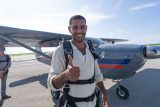
The Most Unforgettable Engagement Idea, EVER!
1 month ago by Skydive Palm Beach
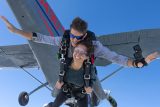
3 Phases of Skydiving: What Happens After You Exit the Aircraft?
2 months ago by Skydive Palm Beach

What Happens After the First Jump?
2 months ago by Skydive Palm Beach
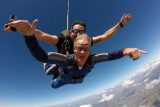
Can You Be Too Old to Skydive?
3 months ago by Skydive Palm Beach
